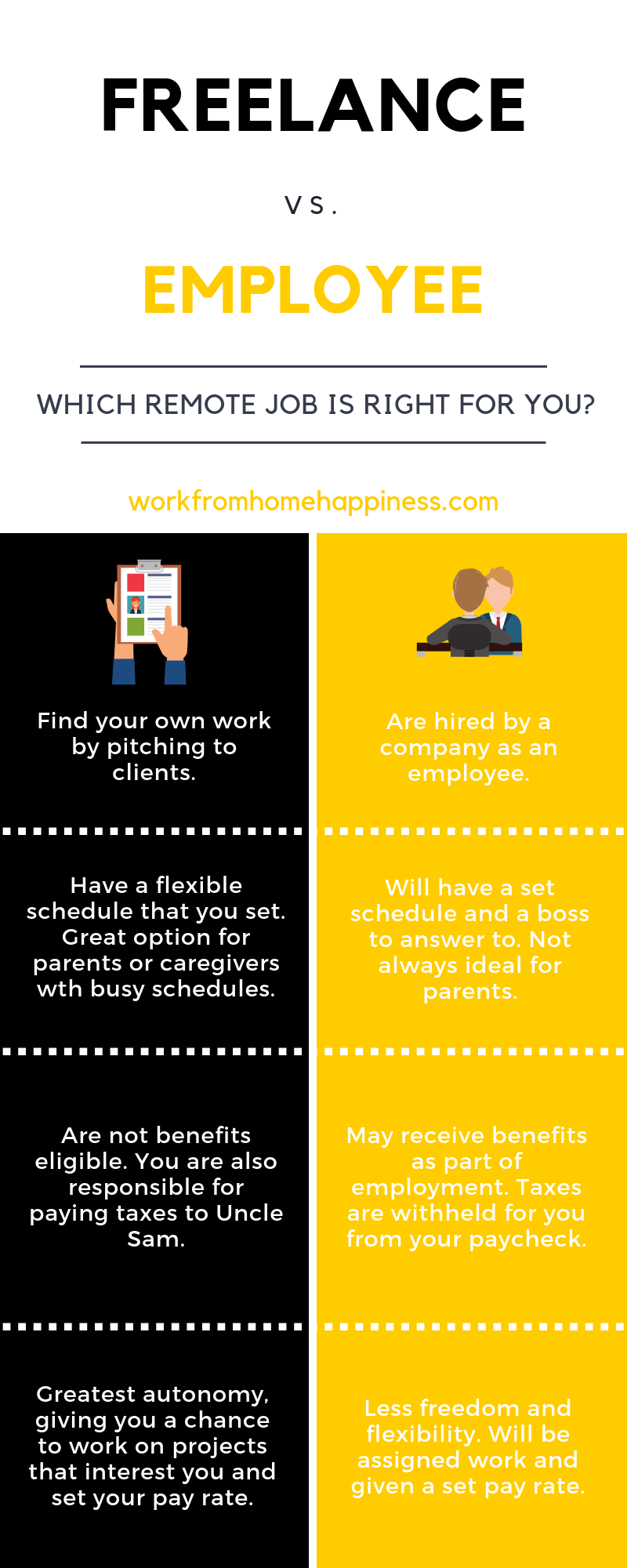 All too often, I receive emails very plainly asking: “How can I work from home?”
All too often, I receive emails very plainly asking: “How can I work from home?”
It’s a fair question, yes. But, my first response to these vague emailers is: “What kind of work are you looking for?”
And, 9 times out of 10, I get the same one-word response: “Anything.”
Hmm.
That’s when I strongly encourage said emailer to pump the brakes and stop their remote job search ASAP.
Why?
For starters, “Anything” is not a job title. And, secondly, not all work-from-home jobs are created equal.
So, to prevent them (and you) from making the mistake of accepting any ol’ remote job just for the sake of telecommuting, I’ve put together this guide on how not to get stuck in a work from home job you hate. Because, there’s nothing worse than finding what you think is your dream job one month only to be dreading every single workday the next.
Don’t Take The Wrong Type Of Position
If you’re an aspiring freelancer, you’re going to feel stifled by a remote employee position that requires you to be tethered to your home office desk eight hours a day. Similarly, if you crave the stability and consistency of a remote-friendly 9 to 5, freelancing gigs may send you into a panic!
Before beginning a remote job search, figure out what kind of remote worker you are.
Generally speaking, there are two main types of remote work:
- Freelance
- Employee
To help you understand the basics of both types, I’ve created a handy infographic explaining the differences:

Once you decide on either freelancing your way to freedom or signing up for a steady employee position, you can focus on finding the type of job you’ll love and avoid those you’ll inherently hate.
Don’t Settle For Any Old Remote Job
It can be easy to get caught up in the thrill of working from home. You’re currently stuck in a cubicle and are desperate to escape it. Who could blame you?
But, don’t let your eagerness to ditch the daily commute cloud your otherwise sound judgement. You should not settle for any old work from home job offer that comes your way.
Sure, the excitement of finally landing a telecommute position might carry you for a few months. But after the newness wears away, so too will your enthusiasm for your new position. And instead of enjoying the work-from-home lifestyle, you’re dreading every single workday just as you did as a cubicle dweller.
Instead of adopting the any-work-from-home-job-is-better-than-my-current-office-job mentality, strive for finding and landing your dream remote job. It’s totally possible.
Find What You Love And Hate To Do
First, audit your existing skills. What do you know how to do? Now from that list, identify what you actually love to do. Sure, you might know the finer points of creating Excel spreadsheets but die inside every time you create a new cell. There are a lot of things you know how to do, but only a few you love to do. Figuring out what you truly enjoy work wise is key to finding a remote job you’ll thrive in.
From there, reflect on past positions. Are there any jobs you hated? Yes? Why did you dislike it so much? Was it the nature of work? Or perhaps it was the type of people you had to interact with. Whatever it is that lead you to hate that job, you want to avoid that in your remote job pursuits at all costs.
Once you have an idea of the daily skills you’d love to use and those working situations you want to completely dodge, you can more easily identify (and avoid) work from home jobs you’ll hate.
So, when you eventually find yourself scouring work-from-home job ads, ask yourself these simple questions:
- Does this job use skills I actually enjoy?
- Will this job keep me from doing things I hate?
If you answered a resounding, “yes” on both fronts — good news! This could very well be a dream remote job situation in the making.
Don’t Go Into A New Remote Job Blindly
You think you’ve identified the right type of job and one that uses some of your favorite skills and omits the things you hate. As a bonus, it’s 100% remote-friendly. Sounds perfect, right?
Not necessarily.
Sometimes, when it comes to career choices, we think we’ve stumbled upon our dream jobs. But, as it turns out, said dream job only looks good on paper. When push come to shove, the so-called dream job is anything but ideal.
Let’s try to avoid that scenario, if at all possible. Remember, the goal here is NOT to get stuck in a work from home job you hate.
So, once you’ve taken your job search online and have started to come across some promising leads. Stop right there!
Before you spruce up your resume and submit your application, it’s time to put on your deerstalker cap and do a little detective work.
You want to understand what a day in the life of (insert job title here) is before you throw your hat in the ring. When you have a better of understanding of what Job XYZ entails, one of two things occurs:
- You decide it’s the perfect job for you.
- You find out it’s not the perfect job after all.
Either way, you save yourself valuable time, energy, and effort by determining whether it’s a good fit before you get hired.
But how do you determine what it’s truly like to work in a job you’ve never actually held before? Good question. You conduct informational interviews.
The Importance Of Informational Interviews
An informational interview is a short and informal Q&A session with someone who can shed light on a particular industry or position. You’ll pick this person’s brain to find the answers to your burning questions. By the end of the interview, you’ll have a solid understanding of the job and whether or not it’s a good fit for you.
Now, before you think that there’s no way that anyone will want to take time out of their busy day to answer your questions — stop right there! The truth is, people LOVE talking about themselves and what they do. Even more so when you approach them the right way.
A short email introducing yourself, identifying how you found them, and explaining that you want to work in (insert industry/job title here) and would love to ask them a few questions about their experiences is often met with enthusiasm from the recipient.
From there you can schedule a short phone call (no more than 20 minutes, please) or send over an email with a list of your top 5 questions you’d love an answer to. Whether your interviewee responds on the phone or in writing, always, always, always follow up with a big thank you email. Your new contact can eventually become a valuable networking connection as you move towards a new remote-friendly career.
Don’t Get Stuck In A Remote Job You Hate, Please
I want you to enjoy the work-from-home lifestyle. If that means temporarily hitting the pause button on your job search, so be it.
Remember, you want to put in the effort from the start to find a remote job you’ll love. This means you need to figure out the right type of remote position for you, identify what you love to do, and determine if a particular job actually fits the bill.
With a little insider insight, you can finally find a remote job you love and avoid getting stuck in one you’ll hate. You’ve got this! 💪🏻
Happily,
Ashlee
P.S. This post may contain affiliate links. To learn more about them, check out my disclosure statement.

Leave a Reply